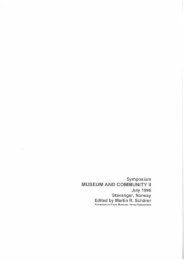Key Concepts of Museology - ICOM
Key Concepts of Museology - ICOM
Key Concepts of Museology - ICOM
Create successful ePaper yourself
Turn your PDF publications into a flip-book with our unique Google optimized e-Paper software.
I NTRODUCTION<br />
In the early 1980s the museum world experienced a wave <strong>of</strong><br />
unprecedented changes: having long been considered elitist and<br />
unobtrusive, museums were now, as it were, coming out, fl aunting a<br />
taste for spectacular architecture, mounting large exhibitions that were<br />
showy and hugely popular and intending to become part <strong>of</strong> a certain<br />
style <strong>of</strong> consumerism. The popularity <strong>of</strong> museums has not failed since,<br />
and they have doubled in number in the space <strong>of</strong> little more than a<br />
generation, while astonishing new building projects spring up from<br />
Shanghai to Abu Dhabi, at the dawn <strong>of</strong> the new geopolitical changes<br />
promised in the future. One generation later the museum fi eld is<br />
still changing. Even if homo touristicus seems to have replaced the<br />
visitor as the main target <strong>of</strong> museum marketing, we can still wonder<br />
about their prospects and ask: is there still a future for museums as<br />
we know them? Is the civilisation <strong>of</strong> material goods crystallised by<br />
museums undergoing radical change? We cannot claim to answer<br />
such questions here, but we hope that those who are interested in the<br />
future <strong>of</strong> museums in general or, more practically, in the future <strong>of</strong> their<br />
own institution, will fi nd in these few pages some elements which may<br />
enrich their thoughts.<br />
François Mairesse and André Desvallées<br />
21
















